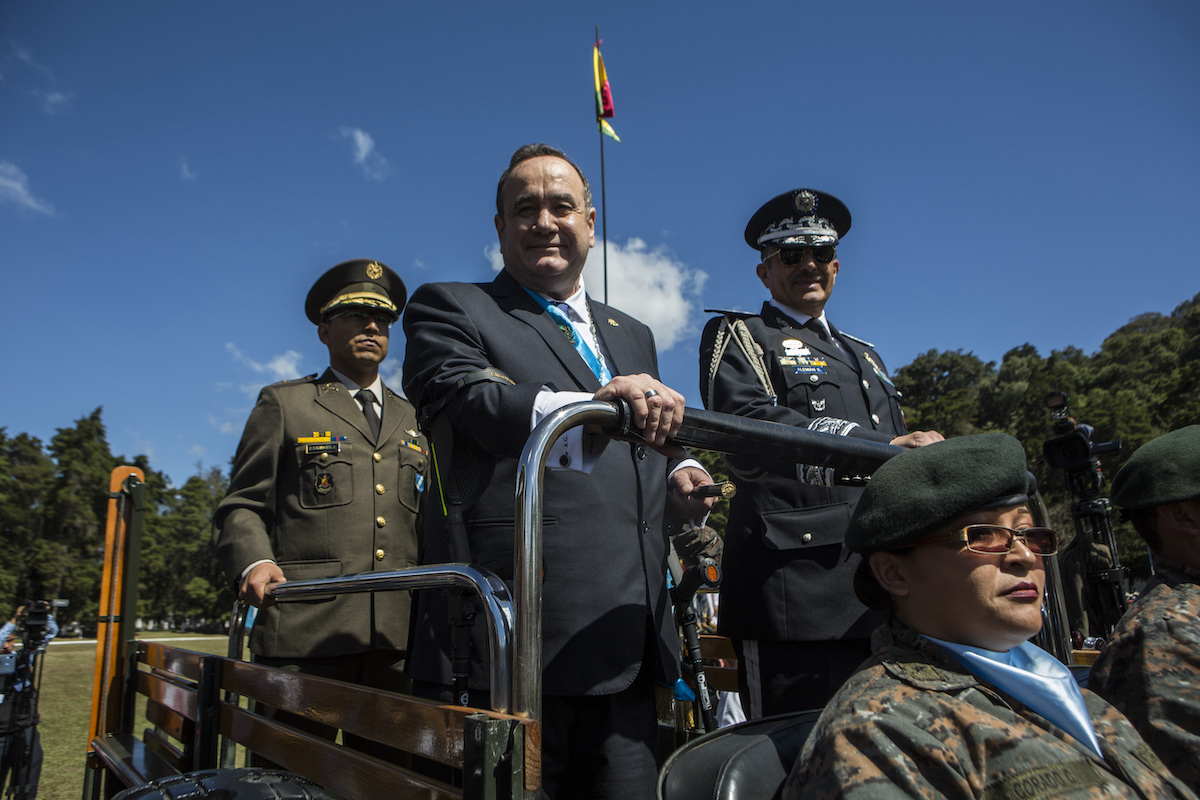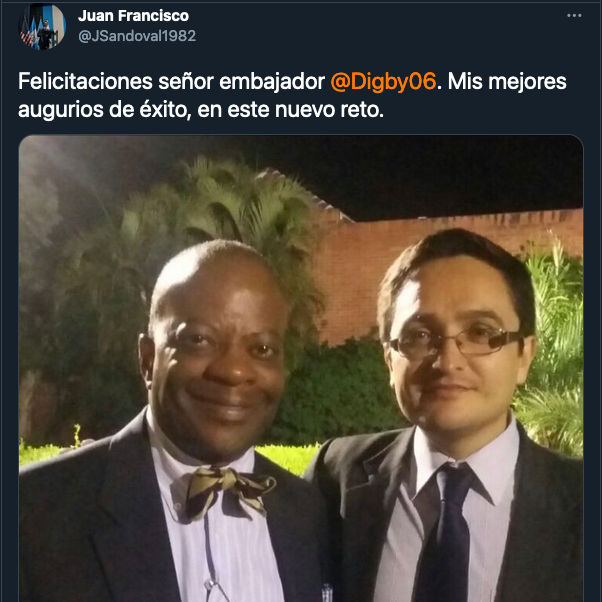

Guatemalan President Alejandro Giammattei reviews the troops during an event recognizing him as commander and chief of the military at Mariscal Zabala military base in Guatemala City, Wednesday, January 15, 2020. (AP Photo/Oliver de Ros)
Welcome to El Faro English.
Central America, in Brief: Persecution of judges and prosecutors, expulsion of international anti-corruption monitors, and cooptation of courts have spread in the region. Iván Velásquez, former head of Guatemala’s UN-backed anti-corruption body CICIG, said in an interview with El Faro that the CICIG closure had a “cascading effect.” “One wonders what legal world we are in. This is Macondo,” says a recently purged Salvadoran judge.
Message to Giammattei
On Tuesday, the U.S. Senate confirmed Todd Robinson, former Ambassador to Guatemala, as Assistant Secretary of State for International Narcotics and Law Enforcement Affairs (INL). Self-exiled in Washington, the recently fired anti-corruption prosecutor Juan Francisco Sandoval celebrated Robinson’s new role by publishing a photo of the two on Twitter.
Robinson’s appointment sends a message to the region’s leaders, given his record of challenging corrupt elites in Guatemala while ambassador, and completes the team leading the Biden administration’s strategy in Central America, right when that strategy appears to be changing.


A week ago, the U.S. State Department added Guatemalan Attorney General Consuelo Porras to the Engel List for “obstruct[ing] investigations into acts of corruption,” most notably by firing Sandoval in July. Angel Arnoldo Pineda Avila, Porras’ right hand, was also added to the list.
After Porras was added to the Engel List, Giammattei tweeted that she was accused “without evidence” and that adding her to the list “violated her human rights.”
Es una falta de respeto hacia las relaciones internacionales que: primero, se acuse sin pruebas o sustentos; segundo, violar los derechos humanos; y, tercero, dar valor a las declaraciones de quienes cuentan con intereses personales y procesos pendientes en Guatemala.
— Alejandro Giammattei (@DrGiammattei) September 21, 2021
Censuring Porras marks a change in tone after months of treating Guatemala as the last-resort ally in the region whose other leaders —Ortega, Hernández and Bukele— are impossible partners. Gestures like the visit of Vice President Kamala Harris in June were not enough to impress President Alejandro Giammattei, and U.S. faith in the Guatemalan government finally cracked when Porras fired Sandoval, who headed the Special Prosecutor’s Office Against Impunity (FECI), a unit specialized in high-stakes corruption cases investigating the upper echelons of Guatemalan politics and business.
Sandoval claims that his removal was because of his investigations into prominent officials. In September, he released scandalous FECI evidence to The New York Times that Giammattei received bribes from Russian mining magnates for rights to coastal port access.
“The Corrupt Think That the Situation Is Going to Be Permanent”
In an interview with El Faro, former CICIG commissioner Iván Velásquez said that Porras’ unjustified firing of Sandoval sent a chilling message to the rest of the justice system: “If they can do this to Juan Francisco, what can’t they do to us?”
“I thought that after everything that happened between 2018 and 2019, the situation of the FECI would be very difficult, but I didn’t think that the attorney general would proceed to annihilate what gave it some recognition,” said Velásquez, who was barred from returning to Guatemala in 2018 when the CICIG’s investigations exposed corruption related to then-president Jimmy Morales.
Porras, who has been in her role since 2018, never supported the FECI and tried to dismantle it, said Velásquez. She refused to close unsubstantiated complaints made against FECI prosecutors and has reassigned prosecutors whose investigations uncover corruption.
In response to Sandoval’s firing, the U.S. announced it was temporarily halting aid and cooperation with the Public Prosecutor’s Office. “We have lost confidence in the attorney general and their decision, and intention to cooperate with the U.S. Government and fight corruption in good faith,” said a State Department spokesperson.
President Giammattei called the decision “counterproductive” to U.S. goals of fighting corruption and organized crime. Velásquez admitted that U.S. support for the Public Prosecutor’s Office has been key to expanding the institution’s capacity to carry out investigations, especially in rural, remote areas.
Al pueblo de Guatemala informo: pic.twitter.com/OvHPz30Vde
— Alejandro Giammattei (@DrGiammattei) July 29, 2021
But the former CICIG commissioner believes that Porras is acting with the support of bigger actors who want to protect themselves from prosecution and have assured her that her actions will not have consequences.
“The corrupt think that this situation is going to be permanent in Guatemala, and that it’s going to be for their whole lives,” Velásquez said.
Light at the End of the Tunnel?
Only three years ago, Guatemala was a regional leader in anti-corruption prosecutions, thanks to the success of the CICIG. In its 13 years of sweeping corruption probes before it was dismantled in 2019, the CICIG revealed a customs fraud that then put former president Otto Pérez Molina behind bars and brought to light the deep links between some of the most powerful companies in Guatemala and corrupt networks, which endured from one government to the next.
“It was a big step,” writes El Faro’s Julie Lopez of the CICIG in her interview with Velásquez, “but it was also the beginning of the end.”
After CICIG investigations set their sights on sitting president Jimmy Morales’s brother in 2017, the administration revoked the visa of then-CICIG commissioner Velásquez. In 2019, in exchange for signing an agreement to accept Central American asylum seekers in Guatemala, Morales gained the political allowance from the Trump administration to expel the CICIG. Since then, the persecution of independent judges and investigators has increased.
Just as the CICIG’s investigations set an example for the region, its closure also sent a message, said Velásquez: “It produced a cascading effect: closure of the CICIG, MACCIH [in Honduras] is not renewed, and a year later it is decided that the CICIES [in El Salvador] was a government commission because it was not a commission in the style of MACCIH, and much less in the style of CICIG.”
“Is there a light at the end of the tunnel?” El Faro’s Julie Lopez asked Velásquez.
“I don’t know how long the tunnel is, but I always maintain hope. We should all maintain hope,” Velásquez said. “There have been important actions from strong sectors of the country…There is a strong enemy that has control of the State. Everyone in favor of democracy, justice, the rule of law, should join the big national movement for the recovery of Guatemala. If citizens become pessimistic, if they lose hope, they surrender. And here what you cannot do is give up.”
El Salvador’s Purge Moves Forward
The Bukele administration’s attacks on judicial independence were one of the main reasons that thousands of people protested in El Salvador this past September 15. But this didn’t stop the Supreme Court from illegally instating 98 judges on Sunday under a controversial judicial reform, which forces judges into retirement after the age of 60 or after 30 years of service and allows the Supreme Court to transfer judges without cause.
A lower court in San Miguel ordered last week that the Supreme Court suspend the implementation of the law while awaiting a final ruling to determine whether the law is discriminatory. Yet the Supreme Court moved forward with naming replacements anyway.
“The court names and transfers judges without any constitutional authority to do so,” judge Edgar Ochoa, who was forced into retirement, told daily newspaper El Diario de Hoy. “One wonders what legal world we are in. This is Macondo.”
Thanks for your time. If you’ve gained from our reporting, consider funding independent journalism in Central America, for the price of a coffee a month, at support.elfaro.net.


